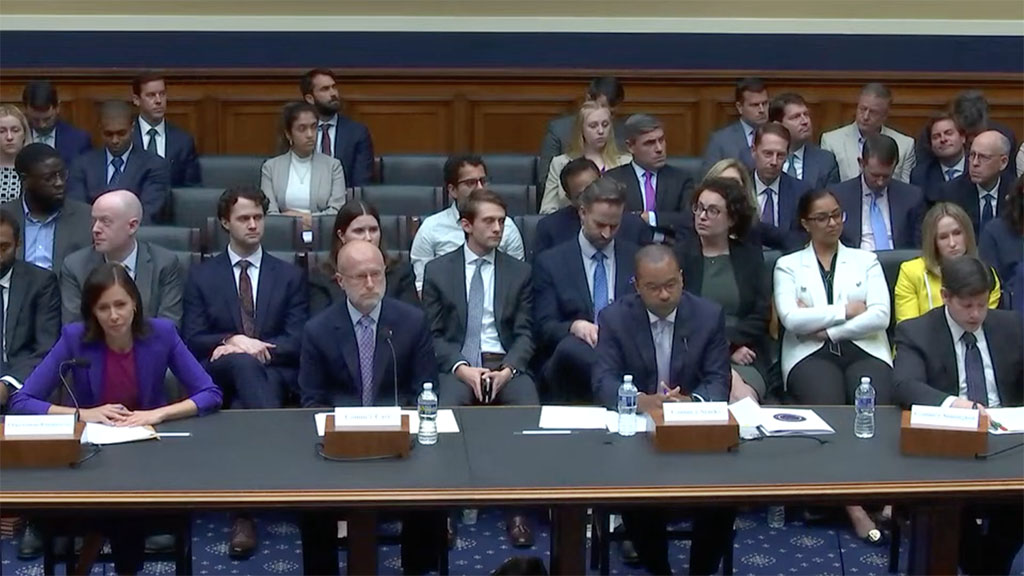House Panel Praises FCC’s Collegial Approach
Bipartisanship is at least partially due to political deadlock

The smarter way to stay on top of broadcasting and cable industry. Sign up below
You are now subscribed
Your newsletter sign-up was successful
The Federal Communications Commission may have hit on the formula for an independent agency to work cooperatively for the public good and draw praise from both sides of the aisle — the lack of a political majority.
The FCC continues to be at a political tie, but the agency drew praise from both sides of the aisle — during a three-hour-plus House FCC oversight hearing Wednesday (June 21) — for its bipartisanship and for actually getting some important things done.
It was the first oversight hearing since March 2022 and, like the FCC, was notable for its collegiality and lack of drama or angst.
Also Read: Rosenworcel Signals FCC Won’t Apply Cable Act Rules to Streamers
The caveat in that collegial FCC approach is that the commission has not been able to reimpose network-neutrality rules or re-regulate broadcast ownership, things that a Democratic majority would almost certainly have already tried to tackle in the two-plus years since President Joe Biden, a Democrat, was elected.
So, the collegiality is definitely at least partially a byproduct of the limits on what the chair can bring up for a vote without facing a deadlock.
That reality notwithstanding, at Wednesday's hearing both Democrats and Republicans praised FCC chair Jessica Rosenworcel and her colleagues for how they had been working cooperatively.
The smarter way to stay on top of broadcasting and cable industry. Sign up below
“[T]he lack of a full Commission has not stopped the FCC from tackling important issues,” said ranking member Rep. Frank Pallone Jr. (D-N.J.). “The impressive bipartisan work reflects positively on chairwoman Rosenworcel’s leadership and on the ability of all four of you to work together, compromise and, largely, put the needs of people over partisan politics.’
Rep. Bob Latta (R-Miss.), chair of the Communications Subcommittee, pointed out during his questioning that most of the votes on FCC items had been unanimous and that it was refreshing to see the FCC acting in a bipartisan way “without straying too far outside of [its] authorizing statute or exercising regulatory overreach.” (A majority Democratic FCC reinstating network neutrality rules, for example, would almost certainly fall under that “overreach” category for Latta.)
Obviously, Republicans also like the fact that the chair can generally only bring up items for a vote that would not draw Republican opposition — like net neutrality rules or broadcast regulations — since “no” votes from the commission's two Republicans would prevent such items from being approved.
Also Read: Simington: FCC Commissioners Need Role in Reviewing Delegated Authority
Pointing out that the Senate would be holding a nomination hearing on Anna Gomez for that third Democratic FCC seat, Latta asked Rosenworcel to commit that if Gomez was confirmed she would continue to seek strong bipartisan agreement and “practice regulatory restraint.”
Rosenworcel did not directly address the restraint part of the question, but did say she was proud of what had gotten done with a 2-2 commission, saying that the FCC had “turned down the noise and ramped up the work.” But the also said that Congress intended the FCC to have five members, so she looked forward to Gomez’s confirmation “sooner rather than later,” adding, “But we will continue to operate in a collegial way with every one of my colleagues no matter who they are or how many we have.”
One definite sign of the collegial tenor at the current FCC was the written testimony of Republican commissioner Nathan Simington, which sounded like it could have come from the Democratic chairwoman. “The FCC has been immensely productive, laser focused on the public interest and on faithfully implementing Congressional mandates,” he told the committee, adding, “The FCC made significant progress on efforts to promote the efficient use of spectrum, to secure our nation’s networks against cyberattacks and on making sure that Earth orbit remains as valuable a resource for future generations as it is for ours.”
Contributing editor John Eggerton has been an editor and/or writer on media regulation, legislation and policy for over four decades, including covering the FCC, FTC, Congress, the major media trade associations, and the federal courts. In addition to Multichannel News and Broadcasting + Cable, his work has appeared in Radio World, TV Technology, TV Fax, This Week in Consumer Electronics, Variety and the Encyclopedia Britannica.

